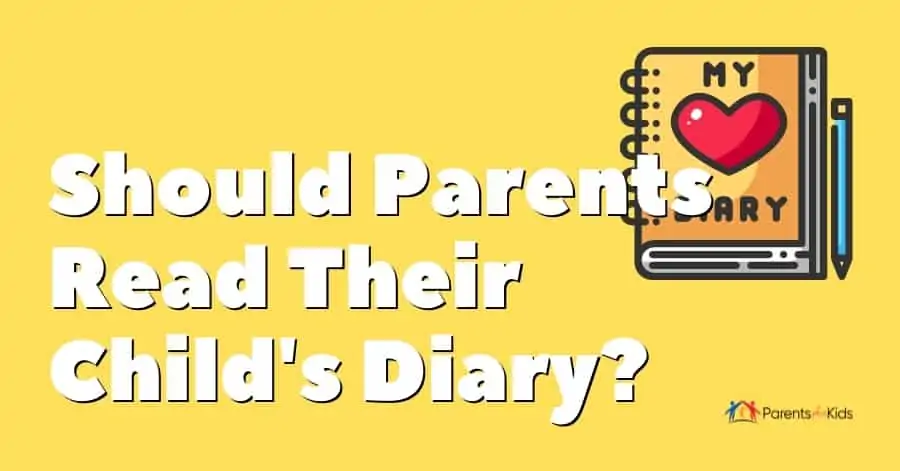Should Parents Read Their Child’s Diary? — Here’s the Hard Truth

This post may contain affiliate links. If you buy through the link, I may earn a commission. Learn More.
A diary is an important place for a child to store their innermost thoughts and feelings.
Unlike a personal blog or an Instagram story, a journal is meant to be kept private. Some parents may feel the need to read this diary, while others consider it off-limits. Who is right?
*FYI, some of the links in this article about should parents read their children’s diary may be affiliate links. If you click and make a purchase, we may get a commission (at no extra cost to you). For more info, please see our disclaimer.
Should Parents Read Their Children’s Diary?
Reading your child’s diary should only be done in the most extreme circumstances. Should a child run away from home or have similar life-threatening issues, the diary may contain information vital to their safety. That said, in almost all cases, your child’s journal should be considered off-limits.
Why You Shouldn’t Read Your Child’s Diary
1. Children Need Safe Spaces, Even from Parents
One of humanity’s greatest fears is having their thoughts read. George Orwell’s “1984” capitalized on this with the Thought Police who could punish people who did not fully conform to the idealized society.
Reading a journal is the same as reading someone’s thoughts. A child needs to know that their thoughts are safe and secure, even from their mom or dad. A sense of security in all of its forms helps a child build self-confidence and healthy relationships.
2. Reading a Diary Can Backfire
Psychologists have learned that children will go further to hide information when they think a parent is reading their diary. The mom who thinks she is growing closer to their child by reading the diary may very well be creating an even bigger divide.
I have some personal experience with this as well. When I was growing up, my friends and I had “decoy” diaries that had mundane details about our days. My decoy diary was where I wrote about crushes, teachers, homework, and frustrations with friends.
My real diary is where I wrote about those things that my parents were actually worried about. Not only did they not get the real details about my daily life, but they proved to me they didn’t trust me or value my privacy.
3. Journaling Can Help in Other Ways
Your child is not likely to continue writing in their diary if they know you’re reading their private words. Journaling should be encouraged because it helps children manage their feelings, learn how to write, and communicate with more ease.
Reading a child’s innermost thoughts, those things they think are private discourages them from continuing the practice. When you read the diary, you damage their trust and their ability to learn from their own thoughts. Journaling is a form of self-reflection, which is known to lead to happier and more successful lives.
My Story: When I Could Have Read My Son’s Journal
My son’s bedroom was in desperate need of organization. He had piles of books, notebooks, and random papers so strewn about the space that he had lost control.
I offered to help him build a system. To say he was less than pleased is a gross understatement. It was a personal affront to him that I would suggest he needed help. He stomped out of the room with his arms crossed, grumbling lowly about how he couldn’t wait to live on his own.
I was grateful to be able to organize in peace. However, things changed when I came across a book that I had never seen before. It had clearly been used often, as was indicated by the well-worn spine.
The navy blue cover had scratches, and a few pieces of paper stuck out of the book in random angles. The word “journal” etched in gold script was still bright, showing that the book was somewhat new but saw daily wear.
I yelled out to my son, asking him to return. He slunk in, brow still furrowed, arms still crossed, and prepared to angrily tell me, once again, that he didn’t need to be organized. An argument about Albert Einstein’s reported lack of organization, a debate I had heard many times, was all but imminent. That was pushed aside when he saw me holding the journal.
“Son,” I said. “I need your help with this. Some of these things look personal, and I don’t want to see anything you would rather I didn’t.”
His hardened stance immediately melted. His narrowed eyes went large, and he lunged at me in a giant hug.
“Thank you, mom, thank you.” He took the journal from me, straightened out the pages, and happily spent the next hour by my side as we found a new system for his room.
That one act of trust was enough to create a bond between my son and myself. I still don’t know what was in that journal, nor will I ever, unless he wants to share. That is exactly how it should be.
Between this reason and the ones I already mentioned above, I hope you can see that there really are many reasons not to read your son or daughter’s diary.
Misuse of Parental Power
Reading a child’s diary is an egregious misuse of parental power. Show your children that you trust them, and they can trust you by letting them have the privacy they are owed.
Final Point
Even if you don’t care about the “misuse of parental power,” make sure you read the points I mentioned above because there are some benefits to you for not reading their diary.
Have you considered reading your child’s diary? Tell us your opinions in the comments.
